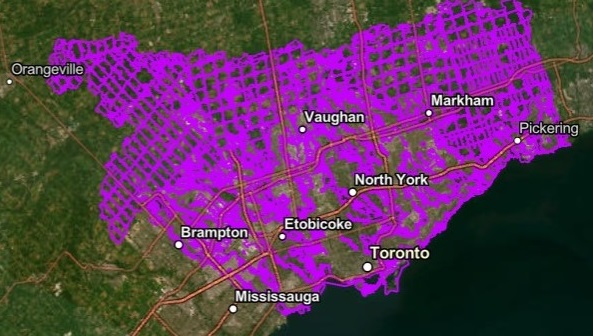When you submit your permit application, Toronto and Region Conservation Authority (TRCA) Planners do an assessment to determine whether the proposed works will affect the control of flooding, erosion, dynamic beaches, pollution or the conservation of land.

The Permit Process
When a permit application is submitted to TRCA, its review is facilitated and managed by a Development Planning and Permits Planner or an Infrastructure Planning and Permitting Planner. Your permit application is managed under the following process:
| 1 | A Planner first reviews the application to confirm TRCA’s interest in the proposal and determine if the submission is complete, based on our complete application checklists. If the application is incomplete, the Planner will request the required information. If an application is complete, or following the submission of additional information, the Planner will conduct a thorough review of the proposal. |
| 2 | Following the Planner’s review, applications are circulated, if necessary, to TRCA technical staff for review. Depending upon the proposal, an application may need to be reviewed by TRCA’s engineers or an ecologist. |
| 3 | Once an application is reviewed by technical staff, and all necessary site visits are conducted to determine or stake the limits of natural features or the physical top-of-bank, the TRCA Planner coordinates the review comments. It is important to note that a site visit may reveal the need for additional technical studies. |
| 4 | If there are outstanding questions or concerns, the Planner will issue a letter detailing our issues or recommendations. In some instances, a meeting is scheduled with the applicant to discuss these comments. TRCA’s comments will typically be directed to the agent and copied to the property owner. |
| 5 | When all concerns have been addressed to the satisfaction of TRCA staff, then the Planner can approve the permit through a delegated approval process or, if the proposal is complex*, must prepare a report for the consideration of TRCA’s Executive Committee. |
| 6 | When a permit application is approved, the plans and supporting documents are officially stamped by the TRCA Planner. One copy of the approved permit is sent to the applicant, one copy is sent to the municipality, one copy is retained for TRCA’s reference, and one copy is provided to TRCA Enforcement and Compliance staff for use in the field. |
| 7 | Under the legislation, the maximum validity of a permit is 24 months. If the works are not completed within the expiry date of the permit, then the applicant must re-apply and delays in approval may result. Typically, the current policies in place at the time of the re-application will apply. |
| *Complex permit applications that do not fall under the delegated approval process must be approved by TRCA’s Executive Committee. Permit reports provide the rationale and justification for the approval of the proposed works and must be finalized two weeks prior to an Executive Committee meeting, generally scheduled for the first Friday of each month. | |

Timelines
TRCA is committed to meeting reasonable review times for all permit applications. Review periods are established on the premise that a level of pre-consultation has been conducted and that the guidelines and most recent policies of TRCA have been addressed. Commitment to review times also assumes submissions are complete.
TRCA will determine whether your application is complete within 14 days (minor applications) or 21 days (major applications) of submission. TRCA will comment on your complete application or issue your permit within 21 days (minor applications) or 28 days (major applications) of confirmation of a complete application.
If a decision has not been delivered by TRCA within the appropriate review times for all permit applications, then the applicant can submit a request for administrative review by the CEO and then if not satisfied, by the Executive Committee.

In many cases, re-submissions are required to address outstanding information needs. The review of re-submissions can require significant time depending on the level of information that is added. Generally 15 business days can be assumed for the review of re-submissions, unless they are identified as complex. A written description of how the new or revised plans or studies address each of TRCA’s comments from the previous submission will help to expedite the review process.
TRCA may request additional information during the review of a permit application if the application does not contain sufficient technical analysis. Subsequent to receiving of a complete application, delays in timelines for decision making on a permit application may occur due to TRCA requests for additional information to address errors or gaps in technical information submitted for review. Therefore, an application can be put “on hold” or returned to the applicant pending the receipt of further information.
Refusal of an Application
Depending on your proposal, a permit application may need to be considered for approval by the TRCA’s Executive Committee. Recommendations will be forwarded to the Executive Committee of the TRCA, which will decide whether to approve or refuse the application.
Enforcement
Enforcement is an important component of the management of natural hazards and features of our watersheds. Accordingly, TRCA has Enforcement Officers who regularly inspect and file reports on works approved under Ontario Regulation 41/24. LEARN MORE.
Associated Documents
TRCA Permit Process
This downloadable graphic provides a visual guide to the Permit Application process
Planning and Development Procedural Manual 5.0 – Permit Applications
TRCA Permit Application Form
Permit Application for Development, Interference with Wetlands and Alterations to Shorelines and Watercourses (Pursuant to Ontario Regulation 41/24)
TRCA Administrative Fee Schedule For Permitting Services
The Fee Schedule adheres to the Provincial Ministry of Natural Resources Policies and Procedures for Charging of Conservation Authority Fees, the TRCA’s Fee Policy Guideline 2009, and the range of planning services consistent with TRCA’s Memorandums of Understanding with area municipalities.

